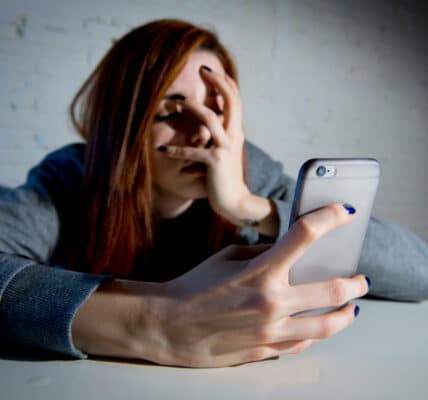Are Smartphones Programming Our Brains for Anxiety and Addiction?

The manner in which most people use their smartphones to scan and enjoy short bits of content may be fueling a discovery and reward cycle that is programming people for anxiety and addiction. This is particularly true of those under the age of 21 whose brains are still maturing.
“Excessive use of screens has become an epidemic silently eroding lives with little resistance,” writes Marina Zhang, health writer for The Epoch Times. She cites studies we have reviewed at AddictionNews where nearly half of teens self-reported being “addicted” to their smartphones.
Just keeping a smartphone near you at all times does not qualify as “addiction.” In fact, there is no “smartphone addiction” recognized as a disorder by the Diagnostic and Statistical Manual of Mental Disorders (DSM-5). However, there is ample evidence that people can become addicted to their phones.
Addiction means not just using the phone all the time but wanting to use the phone less and being unable to do so. It means using the phone to the point where it is harming you and your relationships with those around you, such as neglecting children in your care. But there is another story Marina Zhang is uncovering: that normal use of the smartphone is creating pathways for mental health disorders and substance use disorders. She writes,
Screens can overstimulate our brains, resulting in a perpetual, highly stressed, fight-or-flight state. This then makes us prone to meltdowns, depression, and anxiety when even minor changes in the environment occur.
The anxiety generated by excessive smartphone use, while not qualifying as a disorder, can lead to other disorders such as body dysphoria, anorexia nervosa, and depression. The constant searching/discovery/reward mechanism can stress out the cortisol/adrenaline balance resulting in a build-up of anticipation looking for an outlet.
The process of relieving that anticipation is known as displacement. In some animals, it leads to pacing the cage or excessive licking. In humans, it often leads to eating addiction, tobacco, alcohol, and drugs. If smartphones are programming young people for addiction or mental health disorders, we’re building a mental health crisis of epic proportions.
A study on self-injury and smartphone addiction in Health Psychology Open found “anxiety, together with depression and stress, associates with different levels of Smartphone Addiction severity, while anger particularly distinguishes those showing a more pervasive addiction.” The study offers a unique look at the smartphone use of adolescents who have been diagnosed with non-suicidal self-injury using DSM-5 guidelines. Participants completed a series of questionnaires on such issues as:
- smartphone use
- self-control
- self-injurious thought (non-suicidal)
- alexithymia (“emotional blindness”)
- emotional regulation
The researchers performed regression analysis on the results and the findings were surprising. Gender did not seem to make a difference in the correlation between smartphone use and non-suicidal self-injury (NSSI), but age made a huge difference. The authors advise, “Smartphone Addiction and NSSI significantly and positively predict each other, which seems particularly true for pre-adolescents as compared to adolescents.”
The exact pathways through which an addiction to scanning smartphones contributes to mental illness are unclear. There are no brain imaging studies yet that trace the dopamine released and the damage to decision-making, but they appear to travel the same neurological pathways as other compulsions. We look forward to reporting more on this at AddictionNews.
Written by Steve O’Keefe. First published January 31, 2024.
Sources:
“The Silent Epidemic Eating Away Americans’ Minds,” The Epoch Times, January 16, 2024.
“Self-injury and Smartphone Addiction: Age and gender differences in a community sample of adolescents presenting self-injurious behavior,” Health Psychology Open, October 2021.
“The influence of alexithymia on mobile phone addiction: The role of depression, anxiety and stress,” Journal of Affective Disorders, January 2018.
Image Copyright: peshkova.





2 COMMENTS